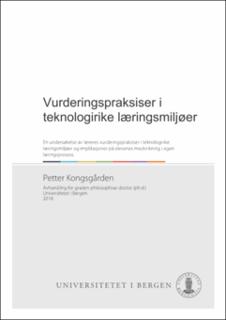| dc.contributor.author | Kongsgården, Petter | |
| dc.date.accessioned | 2019-04-03T08:22:27Z | |
| dc.date.available | 2019-04-03T08:22:27Z | |
| dc.date.issued | 2019-01-08 | |
| dc.identifier.isbn | 978-82-308-3589-0 | |
| dc.identifier.uri | https://hdl.handle.net/1956/19273 | |
| dc.description.abstract | This dissertation positions itself in relation to the key challenges and opportunities faced by teachers and students in Norwegian elementary schools as a result of “digital basic skills” being rated as a basic skill in the curriculum since 2006 (LK-06, Ministry of Education, 2006). The purpose of the dissertation is to situate the dissertation against the existing knowledge base in the field, as well as to contribute to increasing this knowledge base. The context of the study is especially related to the fact that the underlying premises for learning at school have been changed and challenged as digital basic skills have gained a more and more central place in the school's management documents. This can for example be seen in how requirements for information and knowledge that students use to learn no longer are limited to textbooks (Ministry of Education, 2015). Based on this, the dissertation examines how the school helps to develop the students’ ability to maneuver in, assess and apply information in their own learning, and, if possible, how teachers manage to integrate digital tools into teaching and the students' learning. The dissertation looks especially at the challenges and opportunities that crystallize when teachers use digital learning tools and other digital tools in formative assessment processes, and whether this inhibits or promotes more transparent learning processes in relation to the students' learning. The dissertation is article-based and consists of three part-studies and one dissertation summary. The dissertation summary contains an account of the dissertation's positioning and situating to the research field, research design and anchoring in scientific theory, a review of relevant literature and the knowledge base in the field, an account of the dissertation’s theoretical point of view, a description of the methods used, a summary and discussion of the three research articles, and a discussion about implications of the research's main findings, limitations and opportunities for further research. | en_US |
| dc.language.iso | nob | eng |
| dc.publisher | The University of Bergen | eng |
| dc.relation.haspart | Artikkel I: Kongsgården, P. og Krumsvik, R.J. (2013). Bruk av digitale verktøy i elevers læringsarbeid – med fokus på sammenhengen mellom læring og vurdering for læring. Acta Didactica Norge, vol. 7, nr. 1. art. 9. The article is available at: <a href="http://hdl.handle.net/1956/19269" target="blank"> http://hdl.handle.net/1956/19269</a> | eng |
| dc.relation.haspart | Artikkel II: Kongsgården, P. og Krumsvik, R.J. (2016). Use of tablets in primary and secondary school – a case study. Nordic Journal of Digital Literacy, vol. 11, nr. 4, s. 248–273. The article is available at: <a href="http://hdl.handle.net/1956/19272" target="blank"> http://hdl.handle.net/1956/19272</a> | eng |
| dc.relation.haspart | Artikkel III: Kongsgården, P. og Krumsvik, R.J. (2018). Lærerens didaktiske valg i teknologirikt læringsmiljø – en kasusstudie av selvregulert læring blant elever i videregående skole. The article is not available in BORA. | eng |
| dc.title | Vurderingspraksiser i teknologirike læringsmiljøer. En undersøkelse av læreres vurderingspraksiser i teknologirike læringsmiljøer og implikasjoner på elevenes medvirkning i egen læringsprosess. | eng |
| dc.type | Doctoral thesis | |
| dc.rights.holder | Copyright the author. All rights reserved | eng |
| dc.identifier.cristin | 1651815 | |
